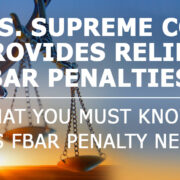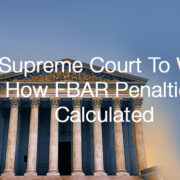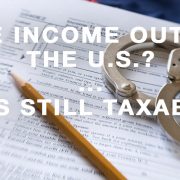U.S. Supreme Court Provides Relief From FBAR Penalties – What You Must Know About IRS FBAR Penalty Negotiations
U.S. Supreme Court Provides Relief From FBAR Penalties – What You Must Know About IRS FBAR Penalty Negotiations
In recent years the IRS has made the Report of Foreign Bank and Financial Accounts (FBAR) penalty enforcement a top priority and this is alarming the taxpayers worldwide. Even in the course of every routine domestic IRS audit, IRS agents are looking for undisclosed foreign bank accounts.
This is what happened to Alexandru Bittner, a Romanian–American dual citizen who was audited by IRS and failed to report his foreign accounts. Neither he nor the IRS has ever suggested that his failure to report funds held in foreign bank accounts was willful. Nevertheless, in calculating the “non-willful delinquent FBAR filing penalty”, IRS came up with $2.72 million and Mr. Bittner contended it should be $50,000.
This dispute was appealed up to the U.S. Supreme Court who issued its ruling on February 28, 2023 (See Bittner v. United States, U.S. Supreme Court No. 21-1195) concluded that the correct calculation of the “non-willful delinquent FBAR filing penalty” is $50,000.
The FBAR Penalty
The Bank Secrecy Act (BSA) requires that a Form FinCEN 114 (formerly Form TDF 90-22.1), Report of Foreign Bank and Financial Accounts (FBAR), be filed if the aggregate balances of such foreign accounts exceed $10,000 at any time during the year. This form is used as part of the IRS’s enforcement initiative against abusive offshore transactions and attempts by U.S. persons to avoid taxes by hiding money offshore.
The penalties for FBAR noncompliance are stiffer than the civil tax penalties ordinarily imposed for delinquent taxes. A taxpayer who non-willfully fails to timely file an FBAR can be assessed a penalty of at least $10,000.00 per year of non-compliance. The IRS has taken the position that this non-willful penalty is assessed on an account-by-account basis. For example, a person whose failure to file an FBAR form is non-willful and has three accounts totaling $50,000 could potentially be assessed the maximum $10,000 penalty for each account, for a total of $30,000 per year, while a person with one account with a balance of $300,000 would pay only one $10,000 penalty per year.
Federal Court Applies FBAR Penalty Reduction
In two recent cases, Federal District Courts held that the $10,000 was assessed per form, not per account. See Bittner, 469 FSupp3d 709 (E.D. Tex./2020) and Kaufman, 2021 WL 83478 (Conn. 2021).
Bittner involved non-willful FBAR assessments totaling $2.72 million against the taxpayer for 2007 through 2011. Mr. Bittner is a Romanian-born naturalized U.S. citizen who returned to Romania in 1990, where he became a very successful businessman and had an interest in or signatory authority over more than 50 foreign accounts. He returned to the United States in 2011. Because he had not filed timely FBARs for 2007 through 2011, the IRS assessed the non-willful FBAR penalties. The Government sued to collect the penalties. The Government moved for partial summary judgment as to the penalty assessed for those accounts Bittner admitted to having a financial interest in. The non-willful penalties assessed for those accounts were $1.77 million. Bittner filed a cross-motion for partial summary judgment, claiming that no more than one $10,000 non-willful penalty can be assessed per annual form.
Kaufman, involved similar non-willful FBAR assessments as Bittner. Mr. Kaufman is a U.S. citizen who has resided in Israel since 1979, where he had multiple financial accounts. His U.S. tax returns were prepared by an American accounting firm. Each year, the accountants would ask if he had any foreign accounts and would advise him that if he did, he may need to file FBAR forms. Each year he told his accountants he did not have any foreign accounts. When asked how he paid his bills, he claimed it was out of a U.S. brokerage account, so they checked the “no” box to the question on the return whether he had foreign accounts. Notwithstanding this evidence, Mr. Kaufman claimed he did not learn of the FBAR filing requirement until September 2011. He also claimed that he suffered a heart attack in late 2010 and was involved in an auto accident in 2011 and that these affected his cognitive abilities.
The Court analyzed the text of the FBAR statute (Code Sec. 5321(a)(5)(A)) recognizing that this provision provides for a penalty “on any person who violates, or causes any violation of, any provision of § 5314”. Query then, what is a “violation” of the statute?
The language of the willful penalty, which bases the amount of the penalty “in the case of a violation involving a failure to report the existence of an account or any identifying information required to be provided with respect to an account, the balance in the account at the time of the violation” seems to infer that Congress intended the willful penalty to be applied on an account-by-account basis.
However, the Court then looked at the language of the non-willful penalty and the reasonable cause exception. While the reasonable cause exception to the non-willful penalty was related to the “balance in the account,” the non-willful penalty itself did not contain any reference to “account” or “balance in the account.” The Court presumed that Congress acted intentionally when it drafted the non-willful penalty language without these references. Further, because the BSA aimed “to avoid burdening unreasonably a person making a transaction with a foreign financial agency,” an individual required to file an FBAR form was only required to file one report for each year. As a result, “it stands to reason that a ‘violation’ of the statute would attach directly to the obligation that the statute creates—the filing of a single report—rather than attaching to each individual foreign financial account maintained.” Additionally, no matter how many foreign accounts a person has, the requirement to file an FBAR is only triggered if the aggregate balance in the accounts is over $10,000. It thus made no sense “to impose per-account penalties for non-willful FBAR violations when the number of foreign financial accounts an individual maintains has no bearing whatsoever on that individual’s obligation to file an FBAR in the first place.”
The Court rejected the government’s arguments that since the reasonable cause exception relates to the “balance in the account” the penalty must apply per account and that since the willful penalty applies on a per-account basis, so must the non-willful penalty. While Congress may have had good reason to assess the willful penalty on a per-account basis, looking to the balance in the account to determine the applicability of the reasonable cause exception did not support the conclusion that Congress meant for the non-willful penalty to apply for a per-account basis given the statutory language.
And now that the U.S. Supreme Court has weighed in, it is clear that the non-willful penalty applied on a “per form basis”.
What You Must Know About IRS FBAR Penalty Negotiations
- The penalties for noncompliance in FBAR enforcement are staggering.
FBAR penalties can be unfair as the penalties are based on the account size and not on how much tax you avoided. This is a stark contrast to other IRS penalties which are based on how much additional tax is owed. Given this difference you will always have a bigger risk and more to lose when dealing with FBAR penalties.
- The two types of FBAR penalties.
The “get off gently FBAR penalty” – If the IRS feels that you made an innocent mistake and “not willfully” ignored to file your FBAR, your “get off gently penalty” will be $10,000 per overseas account per year not reported. To illustrate, if you have five foreign accounts that you failed to report on your FBAR in each of five years, the IRS can penalize you $50,000 per form (as supported by the Bittner and Kaufman cases) or $250,000 if imposed by account regardless of whether you even have that amount sitting in your foreign accounts.
The “disastrous FBAR penalty” – If the IRS can show that you “intentionally” avoided filing your FBAR’s, your minimum “disastrous FBAR penalty” will be 50% of your account value. Additionally, the IRS may also press for criminal charges and if convicted of a willful violation, this can also lead to jail time. The “disastrous FBAR penalty” can also be assessed multiple times thus wiping out your entire savings.
Under both willful and non-willful penalties “the violation flows from the failure to file a timely and accurate FBAR.
- The taxpayer’s burden of proving “reasonable cause”
You are obligated to pay the penalty the IRS deems necessary. The IRS can assume the “disastrous FBAR penalty” and they are not required to prove willfulness. It will be the taxpayer that bears the heavy burden of proving that the taxpayer’s failure to comply was due to reasonable cause and not from “willful neglect”.
- Your appeal option.
Having exhausted all administrative remedies within the IRS first, you can then appeal the proposed FBAR penalties to a Federal District Court but for that court to have jurisdiction you must pay the assessments in full and then sue the IRS in a district court for refund. Since coming up with the money may be impossible for most taxpayers, consider hiring an experienced tax attorney to make the most of the IRS appeals process and perhaps avoid the need for litigation. Keep in mind that in the appeals process, you do not have to pay any FBAR penalty until the end. Second, you can be successful if IRS remedies itself thus making court filings unnecessary. And third, even if the administrative remedies do not yield you success, your tax attorney can attempt to negotiate with the IRS to lower your FBAR penalties without going for a trial.
- The Voluntary Disclosure Route.
The streamlined filing compliance procedures are available to taxpayers certifying that their failure to report foreign financial assets and pay all tax due in respect of those assets did not result from willful conduct on their part. The streamlined procedures are designed to provide to taxpayers in such situations (1) a streamlined procedure for filing amended or delinquent returns and (2) terms for resolving their tax and penalty obligations.
Taxpayers will be required to certify that the failure to report all income, pay all tax, and submit all required information returns, including FBARs (FinCEN Form 114, previously Form TD F 90-22.1), was due to non-willful conduct.
If the IRS has initiated a civil examination of a taxpayer’s returns for any taxable year, regardless of whether the examination relates to undisclosed foreign financial assets, the taxpayer will not be eligible to use the streamlined procedures. Similarly, a taxpayer under criminal investigation by IRS Criminal Investigation is also ineligible to use the streamlined procedures.
Taxpayers eligible to use the streamlined procedures who have previously filed delinquent or amended returns in an attempt to address U.S. tax and information reporting obligations with respect to foreign financial assets (so-called “quiet disclosures”) may still use the streamlined procedures.
What Should You Do?
If you have never reported your foreign investments on your U.S. Tax Returns, you should seriously consider making a voluntary disclosure to the IRS. Once the IRS contacts you, you cannot get into this program and would be subject to the maximum penalties (civil and criminal) under the tax law. The tax attorneys at the Law Offices Of Jeffrey B. Kahn, P.C. located in Orange County (Irvine), San Diego County (Carlsbad) and elsewhere in California are highly skilled in handling tax matters and can effectively represent at all levels with the IRS and State Tax Agencies including criminal tax investigations and attempted prosecutions, undisclosed foreign bank accounts and other foreign assets, and unreported foreign income. Also if you are involved in cannabis, check out what a cannabis tax attorney can do for you. And if you are involved in crypto currency, check out what a bitcoin tax attorney can do for you.











 Follow
Follow Follow
Follow